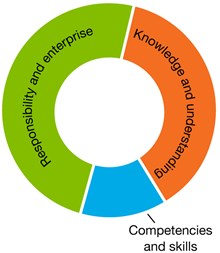Explore content
The Ethical Understanding capability has a role in developing consumer and financial literacy in young people. This capability equips students to take account of ethical considerations in consumer and financial contexts such as human rights and environmental issues related to the production and consumption of goods and services. Ethical Understanding contributes to the development of the dimensions of consumer and financial literacy as shown in the diagram below.

Approximate proportion of the dimensions addressed by Ethical Understanding
Ethical Understanding assists students to navigate the consumer and financial world of competing values, rights, interests and norms. Students build a strong personal and socially-oriented ethical outlook that helps them to manage consumer and financial contexts and to develop an awareness of the influence that their values and behaviours have on others, including the impact of their consumer and financial choices. The Ethical Understanding capability does this through fostering the development of personal values and attributes such as honesty, resilience, empathy and respect for others, and the capacity to act with ethical integrity. Students learn to recognise ethical concepts and explore ethical issues in consumer and financial contexts such as sustainable living and socio-economic disparity. They also learn to consider the outcomes of and reflect on ethical action. This element involves students identifying and examining values and exploring rights and responsibilities of individuals and groups in consumer and financial contexts and practices.
Moneysmart for teachers and Tax, Super and You provide a number of interdisciplinary units and interactive activities that include aspects of the Ethical Understanding capability.
Typically, by the end of Year 4, students:
Recognise ethical concepts
identify ethical concepts, such as equality, respect and connectedness, and describe some of their attributes
Explore ethical concepts in context
discuss ethical concepts within a range of familiar contexts
Reason and make ethical decisions
discuss how people make decisions about their actions and offer reasons why people’s decisions differ
Typically, by the end of Year 4, students:
Reflect on ethical action
consider whether having a conscience leads to ways of acting ethically in different scenarios
Typically, by the end of Year 4, students:
Consider consequences
examine the links between emotions, dispositions and intended and unintended consequences of their actions on others
Examine values
identify and describe shared values in familiar and unfamiliar contexts
Explore rights and responsibilities
investigate children’s rights and responsibilities at school and in the local community
Consider points of view
describe different points of view associated with an ethical dilemma and give possible reasons for these differences

